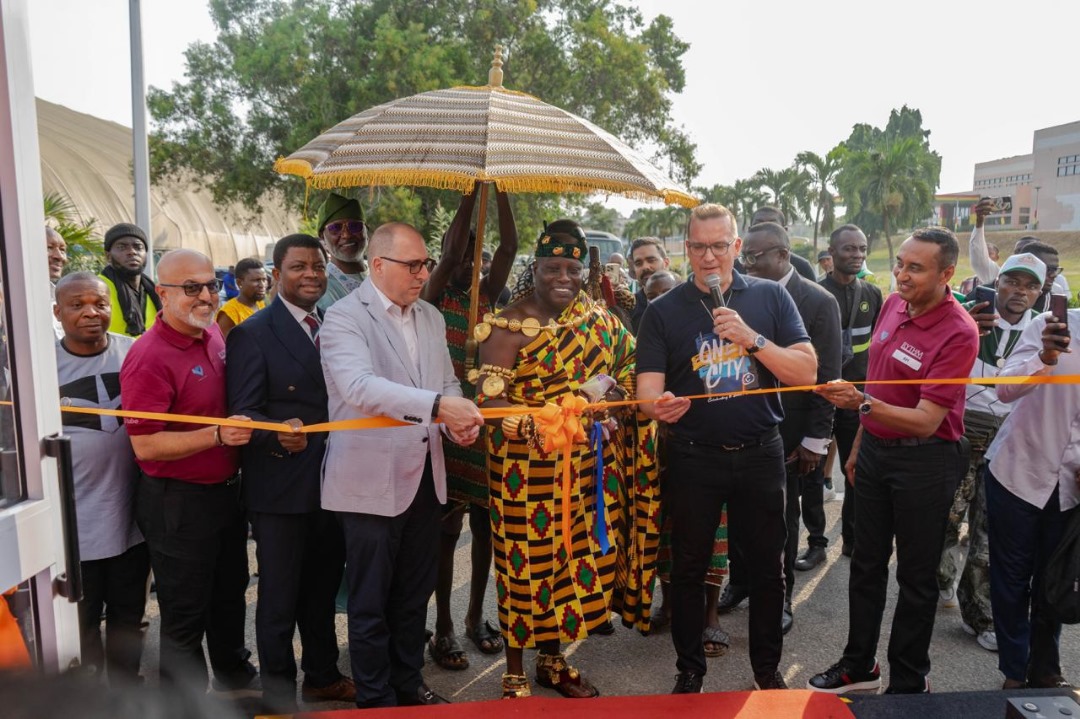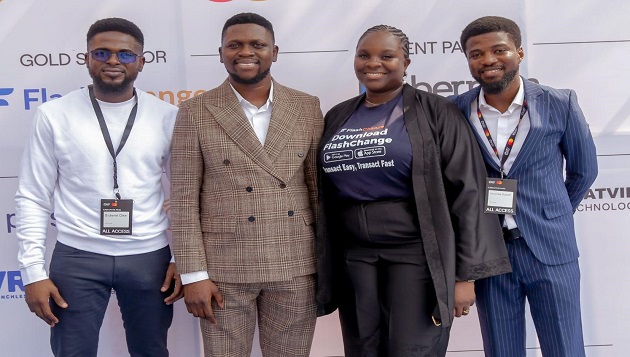General News
Mobile Industry Can Generate $565Bn by Unlocking Right 5G Spectrum – GSMA

Unlocking spectrum for the mobile industry to deliver innovative 5G services across different industry sectors could add $565 billion to global GDP and $152 billion in tax revenue from 2020 to 2034, according to a new report launched today by the GSMA.
Next-generation 5G services will improve access to healthcare, education and mobility whilst reducing pollution and increasing safety.
However, these outcomes rely on government support for the identification of sufficient millimetre wave (mmWave) spectrum for the mobile industry at the next ITU World Radiocommunication Conference in 2019 (WRC-19).
The report, “Socio-Economic Benefits of 5G Services Provided in mmWave Bands”, is the first to examine and quantify the impact of mmWave spectrum on the overall contribution of 5G networks to society. mmWave spectrum will carry the highest capacity 5G services.
It has the ideal characteristics to support very high data transfer rates and ultra-reliable, low latency capabilities, which will support new use cases and deliver the benefits of 5G to consumers and businesses around the world.
Brett Tarnutzer, Head of Spectrum, GSMA, said “The global mobile ecosystem knows how to make spectrum work to deliver a better future.
“Mobile operators have a history of maximising the impact of our spectrum resources and no one else has done more to transform spectrum allocations into services that are changing people’s lives.
“Planning spectrum is essential to enable the highest 5G performance and government backing for mmWave mobile spectrum at WRC-19 will unlock the greatest value from 5G deployments for their citizens.
“More than 5 billion people already rely on the mobile ecosystem to deliver services that are integral to their daily lives and fundamental to the economic sustainability of the communities they live in. 5G can offer more benefits and a whole new range of services to even more people, but this will not be possible without access to this vital spectrum.”
New Possibilities for Consumers and Industry
mmWave 5G will not only provide consumers with ultra-fast mobile broadband services including immersive entertainment, but will stimulate a host of applications that will enable citizens and businesses to do tomorrow what they can’t do today.
These innovations will include enhanced remote healthcare and education, industrial automation, virtual and augmented reality, and many others.
In healthcare, improved telemedicine including tactile internet capabilities, better preventative medicine using always-on remote sensors and wearables, and remote surgery and ‘smart’ instruments will only be made possible because of the speed and latency capabilities enabled by mmWave spectrum.
Next-generation robots, remote object manipulation (controlling machines with precision at distance), drones and other real-time control applications in digitised industrial centres are expected to increase efficiency, reduce costs and improve safety as well as lead to innovations in products and processes.
In autonomous transport, mmWave 5G will enable driverless vehicles to communicate with each other, the cloud and the physical environment continuously to create highly efficient public transport networks.
These and many other innovative use cases are expected to deliver 25 per cent of the overall value created by 5G in the future.
Global growth from mmWave
The early lead already being established in 5G in the Asia Pacific and Americas regions are expected to generate the greatest share of GDP attributed to mmWave 5G, at $212 billion and $190 billion respectively. Europe is forecast to have the highest percentage of GDP growth attributable to mmWave of any region, with 2.9 per cent.
However, the advantages are not restricted to early-adopting mobile markets and, as the rest of the world deploys 5G in subsequent years, economies of scale derived from spectrum harmonisation will stimulate even faster growth. Regions such as Sub-Saharan Africa, Central Asia and Latin America and the Caribbean could see growth in GDP contribution from mmWave 5G applications of over 65 per cent per year from 2026 until 2034.
“It is critical for governments to recognise the importance of the mmWave aspects of 5G when making decisions at the upcoming WRC-19.
“Making the right decisions now on spectrum will be vital to stimulating the rapid growth of economies, especially in developing markets, in the coming decade,” added the GSMA’s Brett Tarnutzer.
“mmWave spectrum has the capacity to support the innovative services expected from the highest performance of 5G, and only the mobile ecosystem has the technical expertise and track record in collaboration to deliver them at a price acceptable to consumers and businesses around the world.”
New mmWave bands for mobile are being discussed at WRC-19, and the GSMA recommends supporting the 26 GHz, 40 GHz and 66-71 GHz bands for mobile.
Global harmonisation of these bands at WRC-19 will create the greatest economies of scale and make broadband more affordable across the world.
Outside the WRC-19 process, 28 GHz is also emerging as an important mmWave band for realising the ultra-high-speed vision for 5G. Commercial services using this band have already been launched in the US and it will also be used for mmWave 5G in countries such as South Korea, Japan, India and Canada.
The report, “Socio-Economic Benefits of 5G Services Provided in mmWave Bands”, which includes details of 5G use cases, value and GDP contribution by sector and geography, can be found here.
The study was conducted by TMG, a consulting firm specialising in the information and communication technologies sector, on behalf of the GSMA.
General News
Government, Development Industries Report Threefold Decrease in Critical Cyber Incidents in 2024

According to the latest Kaspersky Managed Detection and Response (MDR) analyst report, government and development industries experienced a significant decrease in the number of high-severity incidents with direct human involvement in 2024, whereas the food, IT, telecom and industrial sectors demonstrated an increase.

The annual Managed Detection and Response (MDR) analyst report provides insights into detected incidents, their nature and their distribution across various industries and geographic regions.
Additionally, it emphasises the most common tactics, techniques and tools used by attackers over the previous year. The data is based on analysis of incidents detected by Kaspersky MDR.
Compared to 2023, the mass media, development and telecoms industries experienced a significant increase in the number of incidents.
However, when examining high-severity incidents – those that feature direct human involvement – the distribution reveals notable differences.
In 2024, the MDR team identified that the majority of high-severity incidents occurred in IT (23%), followed by the government (18%) and industrial sectors (18%).
The report highlights a significant decrease in high-severity incidents within the government and development sectors, while the number of such incidents in the food sector increased.
Additionally, a relatively large rise was observed in the industrial sector, alongside a slight increase in retail, IT and telecoms. Interestingly, despite the mass media sector facing a substantial increase in overall incidents, this trend did not translate into a corresponding rise in high-severity incidents.
This observation shows that many attack attempts were swiftly detected and mitigated, effectively preventing their severity from escalating beyond medium levels.
“In 2024, we revealed a shift in the landscape of cyber threats, with high-severity incidents increasingly concentrated in the food sector, underscoring the necessity for cybersecurity measures in this area.
While the overall number of incidents surged in sectors like telecom and mass media, the resilience demonstrated in swiftly detecting and neutralising potential threats highlights the importance of proactive measures.
As attackers refine their tactics, organisations must adapt by investing in robust cybersecurity solutions that combine advanced technologies with expert oversight,” comments Sergey Soldatov, Head of Security Operations Center at Kaspersky.
To strengthen your company’s protection against sophisticated attacks, deploy robust cybersecurity solutions and hire qualified practitioners to manage them or adopt managed security services such as Managed Detection and Response and Incident Response.
These security services encompass the complete incident management cycle from threat identification to continuous protection and remediation. They assist in safeguarding against evasive cyberattacks, investigating incidents and offering expert support even if a company lacks security workers.
General News
Ghana Shines as Host of QNET’s Groundbreaking V-Africa 2025 Event

Ghana took center stage as the host of QNET’s highly anticipated V-Africa 2025, a regional edition of the company’s flagship convention.

From February 20 to 23, 2025, the Accra International Conference Centre welcomed over 4000 participants from across the Sub-Saharan Africa region to experience four days of empowerment, networking, and innovation.
The convention spotlighted QNET’s exclusive product offerings, which provide immersive entrepreneurship training and contribute significantly to Ghana’s tourism and economic growth. V-Africa 2025 showcased Ghana as a hub for entrepreneurial excellence.
Trevor Kuna, Chief Marketing Officer for QNET, expressed his enthusiasm: “Hosting V-Africa 2025 in Ghana is a testament to our commitment to supporting entrepreneurs in Africa.
This event isn’t just about showcasing our brand—it’s about empowering individuals to achieve their dreams while contributing meaningfully to local economies. We look forward to welcoming media representatives to witness QNET’s transformative impact firsthand.”
Empowering Entrepreneurs, Celebrating Culture
The itinerary for V-Africa 2025 included product workshops, dynamic training sessions on business building and entrepreneurship, and an exhibition featuring QNET’s signature product brands, such as HomePure range of home care products, Amezcua’s wellness range, Swiss watch brand Bernhard H. Mayer’s new Collection, and more.
Attendees gained invaluable insights into QNET’s ethos of wellness, sustainability, and entrepreneurship, setting the stage for lasting business growth.
Biram Fall, QNET’s Regional General Manager for sub-Saharan Africa, elaborated on the event’s local significance: “V-Africa 2025 will leave a lasting legacy by empowering Ghanaian entrepreneurs and supporting Ghana’s tourism industry.
“This is more than a business convention—it’s a platform for connection, growth, and transformation.”
Driving Tourism and Economic Growth
As one of the largest events of its kind in Ghana, V-Africa 2025 attracted participants from 25 countries, providing a boost to the local hospitality, transportation, and tourism sectors.
QNET’s commitment to Ghana includes partnering with local stakeholders to ensure the event delivers long-term benefits to the community.
General News
FlashChange CEO Seeks Regulatory Clarity in the Blockchain and Cryptocurrency Industry

FlashChange, a forward-thinking financial service company that is redefining how digital assets are traded and managed has recently participated at the Lagos Tech Fest, a two-day event that brought together key stakeholders, industry leaders, and tech enthusiasts to discuss the future of technology in Africa.

The CEO of FlashChange, Bidemi Oke made a strong argument for more transparent regulations in the blockchain and cryptocurrency industry at the event, where he stressed the necessity of structured legislation to promote innovation, safeguard investors, and propel economic progress.
Speaking during a panel discussion alongside other panelists on Crypto in Nigeria: Fintech Integration, Real-World Applications and Opportunities, Oke emphasised the difficulties companies encounter because of legislative ambiguity. He urged legislators to work with industry players to create rules that promote responsible expansion while guarding against abuse.
“The potential for blockchain and cryptocurrencies to transform finance and promote financial inclusion throughout Africa is enormous. However, companies and investors continue to have doubts about the industry’s future in the absence of clear regulations. We must develop a framework that strikes a balance between innovation and consumer protection,” Oke remarked.
As one of Nigeria’s top cryptocurrency exchange platforms, FlashChange, has been leading the charge to encourage secure and effective digital asset transactions. While maintaining adherence to international standards, the business keeps pushing for laws that encourage the expansion of the sector.
The Lagos Tech Fest provided a forum for thought-provoking conversations about how technology, finance, and regulation interact in Nigeria. Many industry participants who agreed that a methodical and forward-thinking approach to blockchain governance was necessary found resonance in Oke’s support for regulatory clarification.

 Telecom2 days ago
Telecom2 days agoSpaceSail, Kuiper Battle Starlink for Souls of Customers

 E-Financial2 days ago
E-Financial2 days agoAfDB, Standard Bank Unite to Support SMMEs and Boost Trade

 News2 days ago
News2 days agoTD Africa’s Accra Synergy Summit to Ignite Tech Transformation in Ghana

 News2 days ago
News2 days agoFuel Scarcity Looms as Marketers Threaten Strike over N100Bn Debt

 Broadcasting2 days ago
Broadcasting2 days agoMultiChoice Announces Fresh Price Hike for DStv, GOtv Packages

 E-Business2 days ago
E-Business2 days agoGmail to Replace SMS Codes with QR Authentication

 News2 days ago
News2 days agoNigeria’s Zuriel Oduwole Nominated for 2025 Nobel Peace Prize

 Telecom2 days ago
Telecom2 days agoSmartcash PSB Wins Outstanding Payment Service Bank at New Telegraph Awards

























